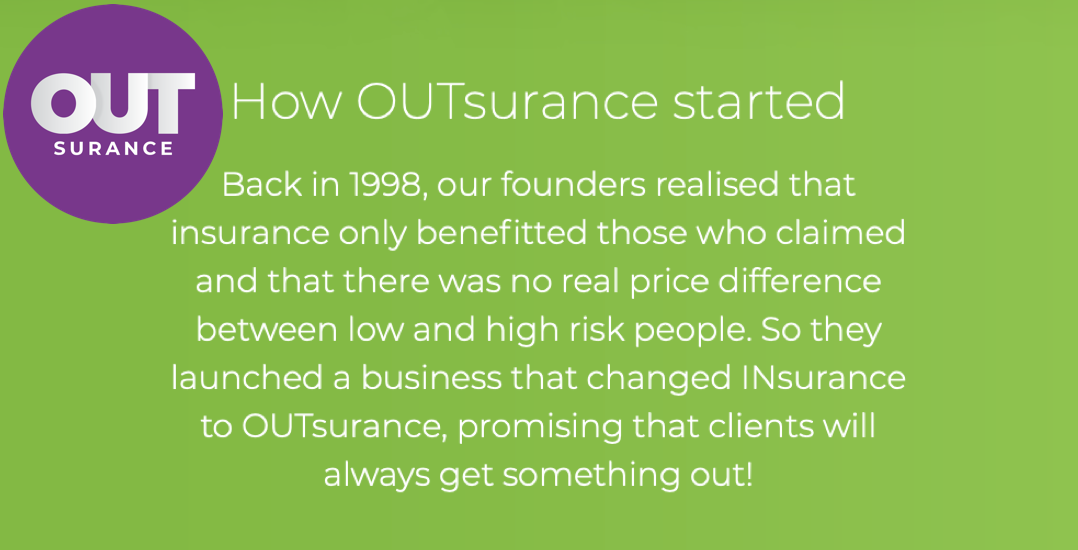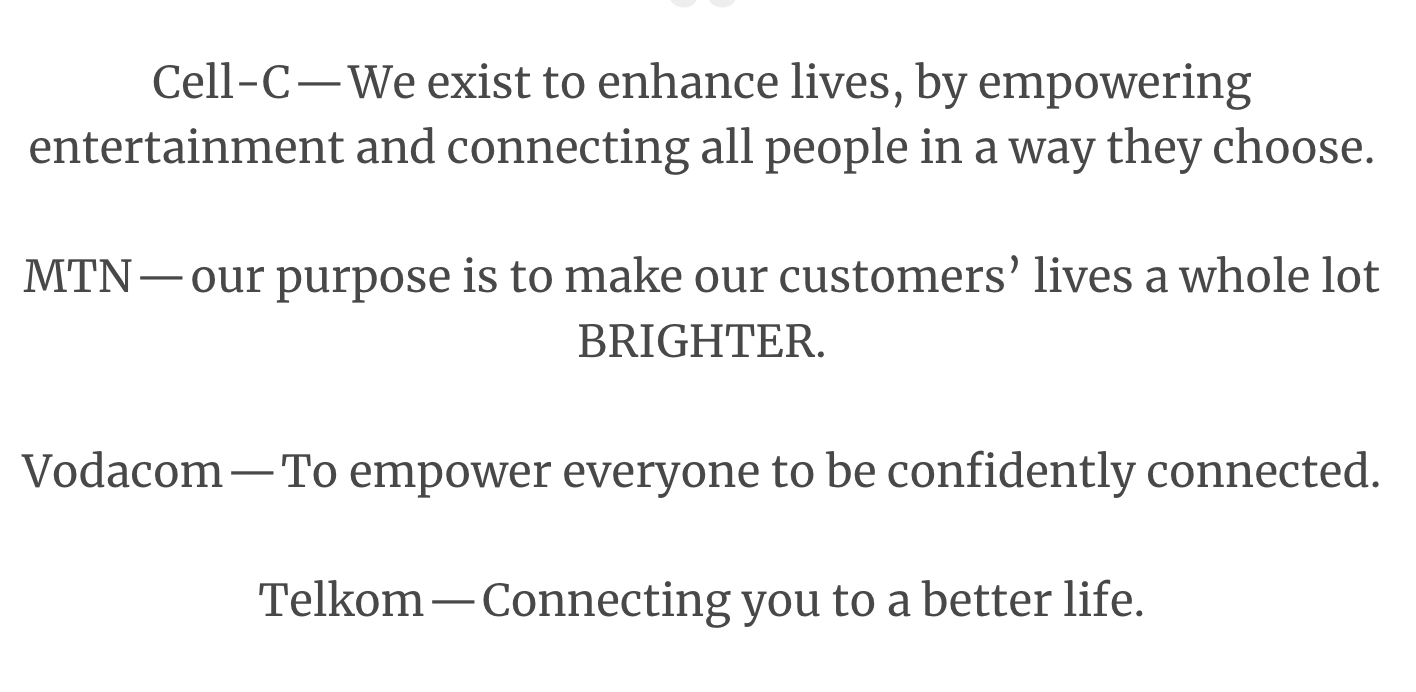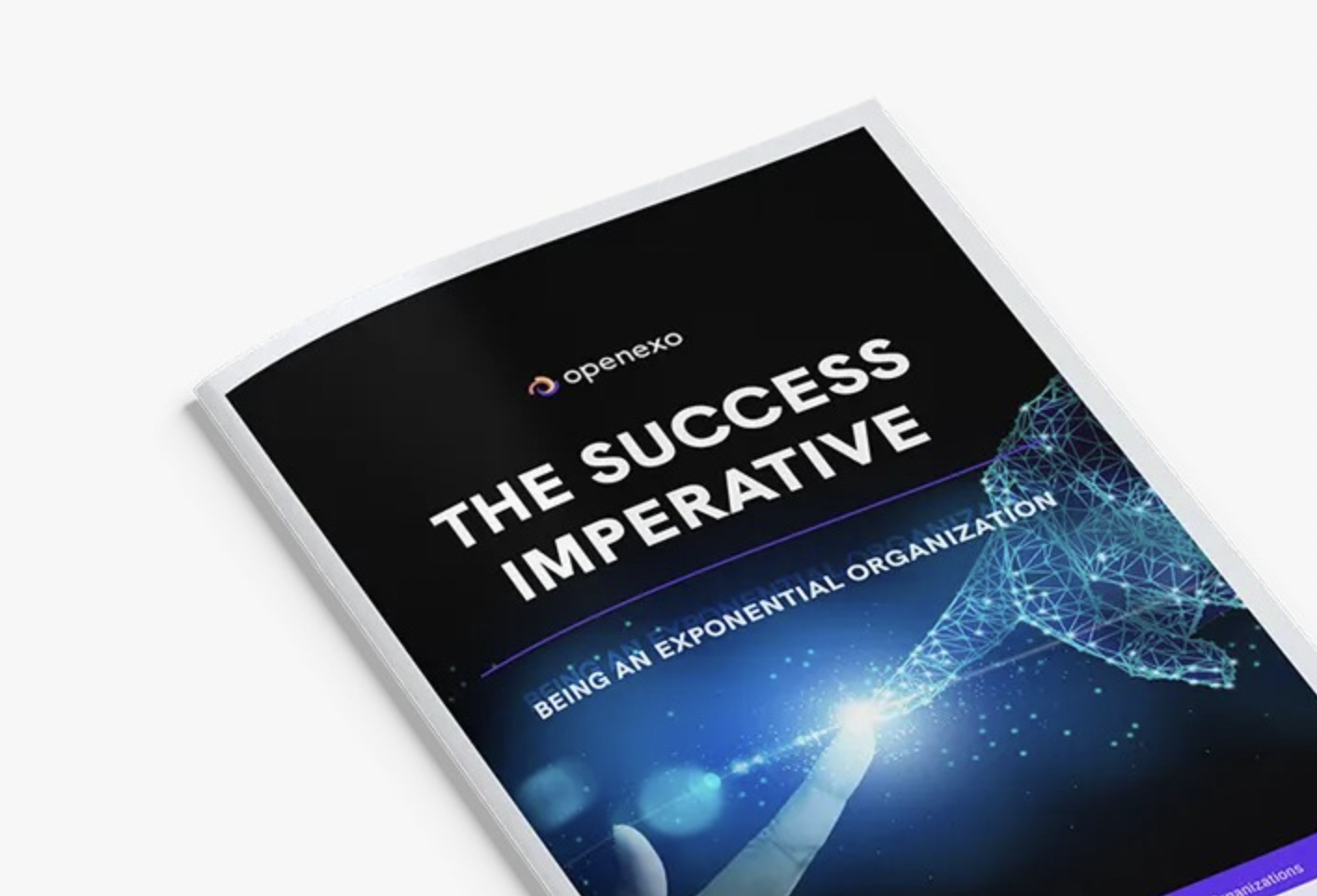
The Threat of Rain?
Purposeful vision is useless if the management team believes the future is predictable and that technology will advance in some sort of linear and orthodox manner.
Don't think there's any chance that RAIN could ever be a serious threat to the big four incumbents? Hang in there.
RAIN is a beautiful example of how startups can create existential threats for big businesses.
But first lets set the scene, by exploring RAIN’s offering.
If your initial impression is that there is not a cat-in-hells chance RAIN could ever be a serious threat to the big four incumbents, hang in there.
That was my first thought too but one that is probably wrong.
RAIN?
If you haven’t heard of RAIN, it is a South African startup that offers retail customers mobile-data, which is only accessible across approximately 10% of South Africa, perhaps substantially less.
Therefore, if you have a RAIN sim, you won’t be able to make phone calls, you won’t be able to send or receive SMS’s and your internet access will only be available across a small percentage of South Africa’s land mass.
Meanwhile, their adversaries are MTN, Cell-C, Vodacom and Telkom, four colossal companies that compete hard to offer competitive data packages, bundled voice and SMS services and provide coverage across 95% of South Africa.
They all also offer data roaming services for international travel.
So how exactly can RAIN pose a threat?
Price?
It has to be the price…right?
And yes, the price is important.
Unsurprisingly, in a country where the need for data is significant and the majority of the population earn very little, homogenous products such as mobile data, are highly price sensitive.
Indeed, many South Africans, purchase multiple sims so they can swap between providers several times a day to ensure they get the cheapest rates.
Marketers can do their best to encourage brand loyalty, but for a product that is so important, yet one that you can’t touch, see or smell, the price will always be important.
And RAIN is certainly doing a great job here with their R50 a gig, 4G data-only service.
In 2018, MyBroadband reported that,
“Vodacom, MTN, and Cell C are all charging R149 for a 1GB data bundle,” said ICASA”.
RAIN’s data, was therefore at this point, 3x cheaper.
But the price isn’t RAIN’s only weapon.
Take a moment to read their full offering….

So, whilst price is important, they are also providing a service that is more equitable and much fairer than their competitors.
The fairness comes from the fact their customers only pay for the data they’ve used at a flat rate.
Compare that to how the incumbent’s force you to pay for data you don’t use and/or penalize you for using more data than was allocated in your bundle and/or penalize you for canceling or downgrading your service!!
(Thankfully ICASA and various consumer actions groups are pushing back, and we can expect some of the worst predatory practices to be regulated out over the coming months.)
Equality comes from the fact the rate doesn’t change based on usage.
This is a radically different approach to that of the incumbents, who compete for heavy data users like myself by offering substantial volume discounts.
The net result is the incumbents end up penalizing the poor to subsidize the rich.
So customers might decide to try RAIN because they are cheaper.
But they become brand ambassadors when they are frustrated with the competition and find an offering that is fairer and more equitable.
This obviously brings tremendous benefits for RAIN across all marketing channels, particularly digital (e.g. google search, twitter, facebook etc) and word-of-mouth.
However, this still does not fully answer why RAIN could have the upper hand.
Their product range is still limited, and they are competing against oligarchs that have immense power.
Perhaps it’s because RAIN has its own version of David’s slingshot. In fact, they have two.
RAIN. A Purpose Beyond Profit.
RAIN, appears from the outside at least, to be a purpose-driven company.
By that, I mean that their primary goal isn’t to generate profit. They are actually trying to solve a social need and believe they can do this profitably.
They seem to want to democratize access to data for all South Africans.
If this is truly an ‘authentic’ purpose, which is ‘supported’ by their investors and leadership team, then they have a big advantage.
And there is evidence to support the view that this purpose is indeed authentic and supported.
Take these three public statements from RAIN co-founder and board member Michael Jordaan.

Source — Talk Radio 702, Bruce Whitfield’s Money Show
The more data our people consume, the better it is for the economy, the more people who have access to the internet, the better it is for the economy. So, we’re trying to play a constructive role in the economy and hopefully build a really good business in the process.
Source — BizNews
The aim is to eventually create an environment where ‘open access’ to the Internet becomes a reality in this country, with the best possible quality and speeds we can deliver, at affordable rates for all.
Source — ITWeb
Marketing hype?
I don’t think so.
Having met Michael on a number of occasions, facilitated strategy sessions for him and sourced feedback from his colleagues, I’m in no doubt that what he says is authentic.
Of course, RAIN isn’t just Michael and the venture will only succeed if the other key stakeholders are equally passionate.
The early signs are however promising.
Not only has Patrice Motsepe’s African Rainbow Capital, invested more than R2bill in RAIN, but they are communicating to their investors that they are willing to forgo dividend, for capital growth opportunities.
The fact that Willem Roos, founder and now ex-CEO of OUTsurance, has taken the role of CEO at RAIN also bodes well. He not only built an incredibly successful and disruptive insurance company, but he did it with a purpose-driven strategy.

RAIN. An Exponential Vision?
RAIN’s purposeful vision of working towards democratizing data access for all South Africans has helped create a company that investors, leaders, and customers wish to support and be part of.
But a purposeful vision is useless if the management team believes the future is predictable and that technology will advance in some sort of linear and orthodox manner.
When you believe the opposite and therefore experience fear and excitement about the impact of rapid technological shifts, it’s easier to conclude that survival requires a thirst for continual experimentation, innovation, and reinvention.
This, in turn, requires leaders who are comfortable enabling and empowering others rather than dictating to and deciding for others.
Interestingly, Jordaan is an Alumni of Singularity University and was mentored by Salim Ismail, author of Exponential Organisations and founder and chairman of OpenExo. We could, therefore, assume that RAIN will be searching for Exponential thinkers?
But is there any real evidence on the ground?
RAIN. Evidence of Purpose & Vision.
Let’s continue with the assertion that RAIN is a purposeful organization with exponential thinkers.
They would believe that technology will quickly enable exponential drops in the price and exponential increases in the demand for data.
They would believe they can now access technology that allows them to develop a business model, which will, over time, drive their marginal cost of supply down towards zero (i.e. for each customer onboarded, the marginal cost of supporting that customer reduces).
They would believe that these changes will quickly lead to significant shifts in consumer behaviors.
It would then be somewhat obvious that…
-There is no point in offering voice and SMS services as they will quickly become irrelevant as digital apps, such as WhatsApp and Facetime, become the norm for all communications.
-There is no point looking to expand your network coverage with 2G/3G when future demand makes the service as useful as ‘dial-up’ is today.
-You’d avoid building out a staffed branch network to support a dying retail sales model and focus on an efficient online-only offering.
-You’d look for funding from ‘partner’s who support your vision and are prepared to forgo short term profits, for longer-term value.
-You’d initially only offer services in metropolitan areas, as the technology is not yet available, at a price point which allows you to ensure the marginal cost of supply is tending to zero.
Looking forward who would bet against RAIN …
-Aggressively supporting the introduction of eSim’s in the South African marketplace so the customers can use RAIN data in the cities and the incumbent’s services for voice/SMS and data in the regions?
-Seeking partnerships with companies that have similar visions about the future of data, particularly to service students and those living in remote locations. One Web, SpaceX and Loon all spring to mind as each of them is looking to democratize global access, whether from space or ballon?
-Investigate ‘smart’ GPS-enabled advertising to fully transfer the cost of data away from the consumer.
-Introduce technologies to remove the need for staffed call centers, such as Soul Machine’s artificial humans.
-Taking RICA virtual to allow instant onboarding, using facial and voice recognition technologies, machine learning algorithms, apps, eSignatures, and API’s to source and populate customer data.
So RAIN might have the advantages today of being purposeful visionaries who have created a product that is fair and equitable at a very competitive price point.
But why cannot the big four adjust their strategies to kill this threat?
They can, in theory, but it’s the practice that is hard.
Incumbents. Pivoting is Hard.
Let’s start with some facts.
Firstly we know that every company has a finite lifespan.
Secondly, we also know that the average lifespan for an S&P500 company has declined from 60+ years in the 1950s to less than 20 years today.
Thirdly, this is a global phenomenon. Think about Netflix, Tesla, Amazon, Airbnb and Uber in the US or Capitec, Discovery and Outsurance in SA.
Why is this trend happening and will it continue?
I think Alex Rampell nails the ‘why’ with this quote.
The battle between every startup and incumbent comes down to whether the startup gets distribution before the incumbent gets innovation.
source — Alex Rampell
Large organizations are typically not nimble enough to adapt quickly to the threats that startups pose.
The threat of the startup for incumbents is only likely to accelerate as new technologies enable new entrants to create new markets at incredible speeds.
So perhaps large organizations need to start introducing the business models that the startup community has been using for years?
Perhaps they should look to become more purposeful and develop strategies that are better suited for a world where the rate of change has moved from linear to exponential?
Could the four incumbents pivot away from their primary focus on generating profit to a purposeful vision, which has more authenticity and meaning than their published statements?

I believe they can, but history shows that this happens infrequently. It would certainly require an incredibly brave Chief Executive to attempt to pivot from a profit-first to a purpose-driven model.
Imagine the reaction if any one of these operators announced they were switching from
‘we intend to grow our market share by x% and deliver increased margins of y% by focusing on..’,
to
‘we intend to democratise data for all South African’s and focus our work on pushing prices towards zero’
There would be a shareholder riot.
And it’s this structural conundrum that makes it difficult for the likes of MTN, Vodacom, CellC and Telkom, or indeed any large incumbent in any industry, to adapt to the threat that RAIN and startups like RAIN pose.
After all, the large mobile operators,
-cannot simply switch off their support for customers using their legacy networks.
-cannot close down all of their stores, owned or franchised.
-cannot significantly reduce their headcount because of unionization (and I hope common human decency).
-cannot offer their customers fair and equitable prices without a substantial reduction in revenue, which may then make them unprofitable.
-cannot stop supporting regional customers who have a higher marginal cost of supply than those in metropolitan areas.
They may want to make these changes.
They probably would make these changes if given time.
But time is the one asset large incumbents don’t have, in a world where the rate of change has switched from linear to exponential.
This article was originally featured on ExO Works on May 13, 2019.

ExO Insight Newsletter
Join the newsletter to receive the latest updates in your inbox.









